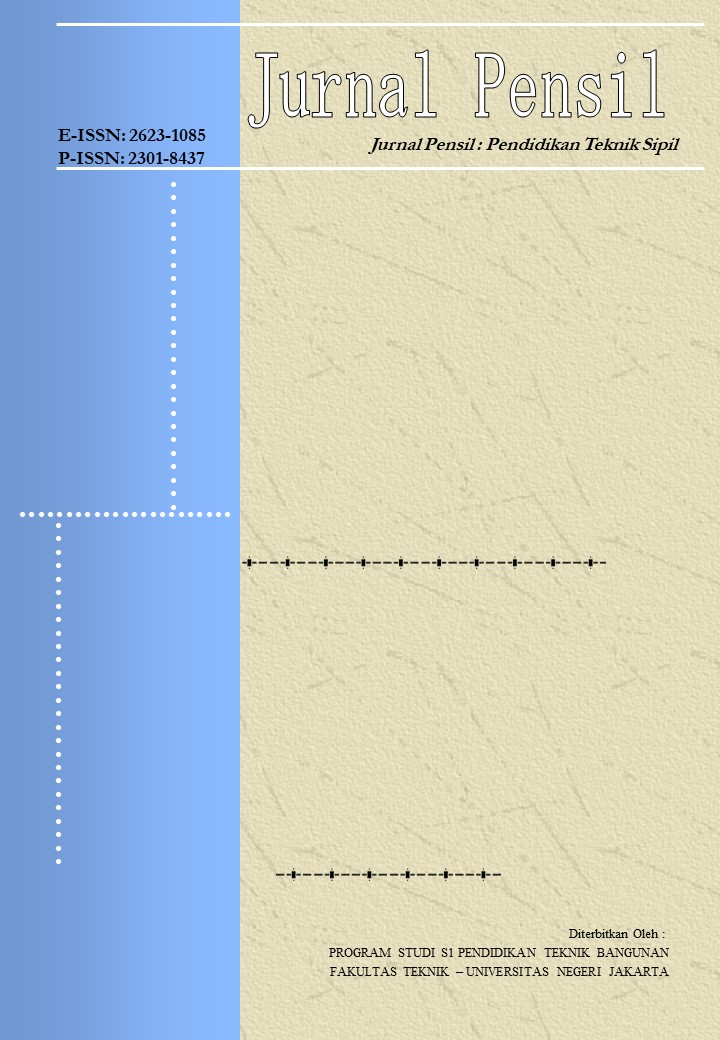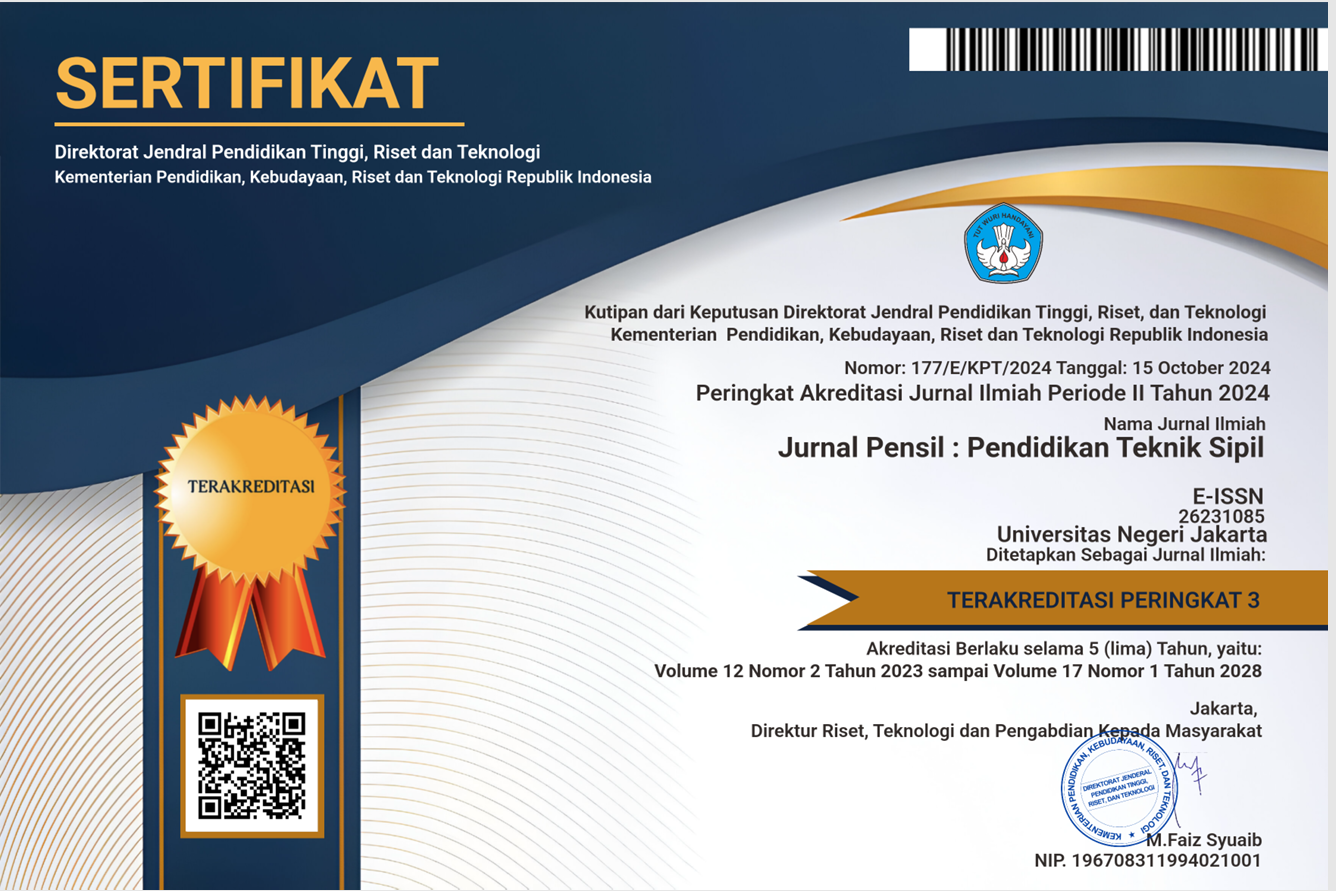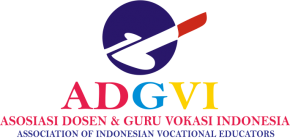COMMUNITY SATISFACTION INDEX (SMI) REPORT AT SMKN 1 CIBINONG
DOI:
https://doi.org/10.21009/jpensil.v11i1.18425Keywords:
Public Satisfaction, Community Satisfaction Index, Vocational High SchoolAbstract
The purpose of this study was to determine and analyze the level of community assessment of the performance of learning services at SMKN 1 Cibinong Bogor. As it is known, Vocational High Schools (SMK) can be viewed as an institution that offers services in the form of education processes, especially education services as a continuation of first-level education (SMP) and graduates of Madrasah Tsanawiyah (MTs). The main goal of a service agency is how its customers get the satisfaction they expect. When observed. The main customers of a Vocational High School (SMK) are students and parents of students. Therefore it can be said that the satisfaction of parents and students in general and the wider community in general is a priority that must be put forward. With regard to the services offered by SMKN 1 Cibinong, the obligation to carry out education and teaching is the most important activity and is directly related to students. To find out how the service performance of SMKN 1 Cibinong in implementing education and teaching will be measured by how the satisfaction of students who take part in learning activities. The method carried out is by surveying students and conducting the survey referring to the Regulation of the Minister for Administrative Reform and Bureaucracy No. 16 of 2014 concerning Guidelines for Survey of Community Satisfaction on Public Service Delivery. To obtain the Community Satisfaction Index (IKM) value the following formula is used: IKM =( Total of Perceived Value per Element / Total Elements filled in) x Weighted Value. Meanwhile, to obtain the conversion value of the IKM result from the Service Unit IKM Value x 25, the result for the Community Satisfaction Index (IKM) Value of SMKN 1 Cibinong in 2017 is 81.88 with Service Quality B and Service Unit Performance Good.
References
Beeri, I., Uster, A., & Vigoda-Gadot, E. (2019). Does performance management relate to good governance? A study of its relationship with citizens’ satisfaction with and trust in Israeli local government. Public Performance & Management Review, 42(2), 241–279.
Bouckaert, G., & Van de Walle, S. (2003). Comparing measures of citizen trust and user satisfaction as indicators of ‘good governance’: Difficulties in linking trust and satisfaction indicators. International Review of Administrative Sciences, 69(3), 329–343.
Brown, J. D. (2002). The Cronbach alpha reliability estimate. JALT Testing & Evaluation SIG Newsletter, 6(1).
Christensen, T., Yamamoto, K., & Aoyagi, S. (2020). Trust in local government: Service satisfaction, culture, and demography. Administration & Society, 52(8), 1268–1296.
Denhardt, J. V, & Denhardt, R. B. (2015). The new public service revisited. Public Administration Review, 75(5), 664–672.
Di Fabio, R. P. (1987). Reliability of computerized surface electromyography for determining the onset of muscle activity. Physical Therapy, 67(1), 43–48.
Douglas, J., Douglas, A., & Barnes, B. (2006). Measuring student satisfaction at a UK university. Quality Assurance in Education.
Etikan, I., Musa, S. A., & Alkassim, R. S. (2016). Comparison of convenience sampling and purposive sampling. American Journal of Theoretical and Applied Statistics, 5(1), 1–4.
Facio, A. (1995). From basic needs to basic rights. Gender & Development, 3(2), 16–22.
Frey, F. (2017). SPSS (software). The International Encyclopedia of Communication Research Methods, 1–2.
Khakimova, D. (2019). Advantages And Disadvantages Of Observation. Вопросы Науки и Образования, 7, 144–146.
Khosroshahi, H., Rasti-Barzoki, M., & Hejazi, S. R. (2019). A game theoretic approach for pricing decisions considering CSR and a new consumer satisfaction index using transparency-dependent demand in sustainable supply chains. Journal of Cleaner Production, 208, 1065–1080.
King, C. A. (1995). What is hospitality? International Journal of Hospitality Management, 14(3–4), 219–234.
Kleinnijenhuis, J., & Van Hoof, A. M. J. (2008). Media coverage of government policies and public satisfaction with information provision and policy results. Political Quarterly/Politische Vierteljahreschrift.
Kumasey, A. S. (2014). Service quality and customer satisfaction: Empirical evidence from the Ghanaian public service. In European Journal of Business and Management. core.ac.uk. https://core.ac.uk/download/pdf/234625315.pdf
Ma, L. (n.d.). Citizen Participation, Perceived Public Service Performance, and Trust in Government.
Marlin-Tackie, F. A., Polunci, S. A., & Smith, J. M. (2020). Fracking controversies: Enhancing public trust in local government through energy justice. Energy Research & Social Science, 65, 101440.
Meissner, R., Funke, N., Nortje, K., Jacobs-Mata, I., Moyo, E., Steyn, M., Shadung, J., Masangane, W., & Nohayi, N. (2018). Water security at local government level in South Africa: a qualitative interview-based analysis. The Lancet Planetary Health, 2, S17.
Mihelis, G., Grigoroudis, E., Siskos, Y., Politis, Y., & Malandrakis, Y. (2001). Customer satisfaction measurement in the private bank sector. European Journal of Operational Research, 130(2), 347–360.
Milovanović, M., & Perišić, J. (n.d.). Advantages and limitations of using SPSS in teaching statistics. MEFkon 2020 INNOVATION AS AN INITIATOR OF THE DEVELOPMENT “INNOVATIONS IN THE FUNCTION OF DEVELOPMENT,” 274.
Moodie, G. (2002). Identifying vocational education and training. Journal of Vocational Education and Training, 54(2), 249–266.
Murgianto, M., Sulasmi, S., & Suhermin, S. (2016). The effects of commitment, competence, work satisfaction on motivation, and performance of employees at integrated service office of East Java. International Journal of Advanced Research, 3, 378–396.
NEGARA, K. P. A., BIROKRASI, D. A. N. R., & INDONESIA, R. (2014). Pedoman Survei Kepuasan Masyarakat Terhadap Penyelenggaraan Pelayanan Publik. Jakarta: Kementerian Pendayagunaan Aparatur Negara Dan Reformasi Birokrasi RI.
Pestoff, V. (2018). Co-production and public service management: Citizenship, governance and public service management. Routledge.
Putra, A. S., Handoyo, S. S., & Rochadi, D. (2018). Kualitas Layanan Akademik Mahasiswa di Program Studi Pendidikan Vokasional Konstruksi Bangunan Universitas Negeri Jakarta. Jurnal Pensil: Pendidikan …. http://journal.unj.ac.id/unj/index.php/jpensil/article/view/8380
Rahmad, R., Sabri, S., & Nasfi, N. (2022). Analysis of Community Satisfaction Index in Acceptance of Administrative Services. International Journal of Social and Management Studies, 3(1), 247–258.
Saltmarsh, S., Barr, J., & Chapman, A. (2015). Preparing for parents: How Australian teacher education is addressing the question of parent-school engagement. Asia Pacific Journal of Education, 35(1), 69–84.
Sari, L., Susena, K. C., & Nengsih, M. K. (
2021). Analysis of Community Satisfaction Index (SMI) Towards Public Services of the Dukcapil Department of Seluma District. Journal of Indonesian Management (JIM), 1(3), 377–385.
Stone, H., Sidel, J. L., & Bloomquist, J. (2008). Quantitative descriptive analysis. Descr. Sens. Anal. Pract., 13, 112–114.
Suzuki, K., & Demircioglu, M. A. (2021). Is impartiality enough? Government impartiality and citizens’ perceptions of public service quality. Governance, 34(3), 727–764.
Syardiansah. (2017). Analisis Indeks Kepuasan Pelayanan pada Perpustakaan Fakultas Ekonomi Universitas Samudra. JURNAL MANAJEMEN DAN KEUANGAN, 6(1).
Taylor, E. S., & Tyler, J. H. (2012). The effect of evaluation on teacher performance. American Economic Review, 102(7), 3628–3651.
Tsang, M. C. (2000). Education and national development in China since 1949: Oscillating policies and enduring dilemmas. China Review, 579–618.
Tushnet, M. (1991). Civil rights and social rights: The future of the reconstruction amendments. Loy. LAL Rev., 25, 1207.
Utami, W. S., & Suryanto, S. (2013). Indeks Kepuasan Masyarakat pada Pelayanan Kantor Kecamatan di Surakarta, Indonesia. Jurnal Ekonomi & Studi Pembangunan, 14(2), 174–184.
Volodina, A., Lindner, C., & Retelsdorf, J. (2019). Personality traits and basic psychological need satisfaction: Their relationship to apprentices’ life satisfaction and their satisfaction with vocational education and training. International Journal of Educational Research, 93, 197–209.
Yeti, M. (2012). Laporan Hasil Indeks Kepuasan Masyarakat (IKM) Terhadap Pelayanan Publik Di SMK Negeri 1 Cibinong.
Zhi-zeng, L. (2008). On Public Officers’ Administrative Responsibility Ethics. Journal of Hebei Youth Administrative Cadres College, 3











.png)
.png)
1.png)

